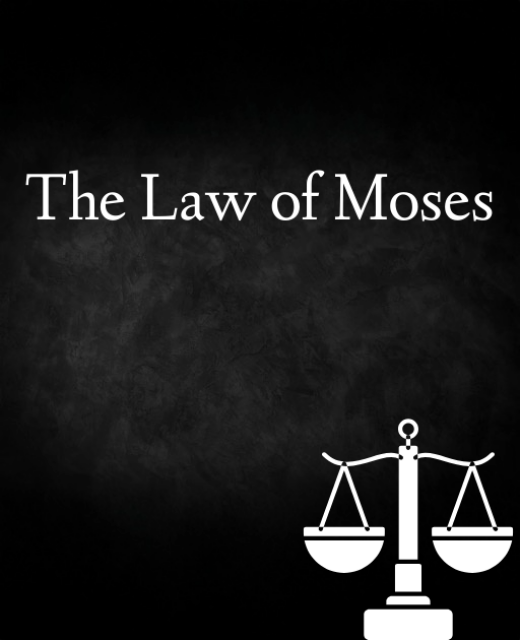
The Law of Moses (Exodus - Deuteronomy)
Description
Add Stephen's Wisdom Journey teaching series from Exodus through Deuteronomy to your personal dashboard.
PLEASE READ:
Once you check out, these lessons will appear in your personal dashboard. You can:
- Watch these lessons on demand.
- Take notes and journal in your personal notepad.
- Go through The Wisdom Journey at your own pace.
INSTRUCTIONS:
- Click the "STORE" link at the top of our homepage.
- Sign In to your store account.
- These lessons will be in the "MY MEDIA" section of your dashboard.
Products Included in Bundle
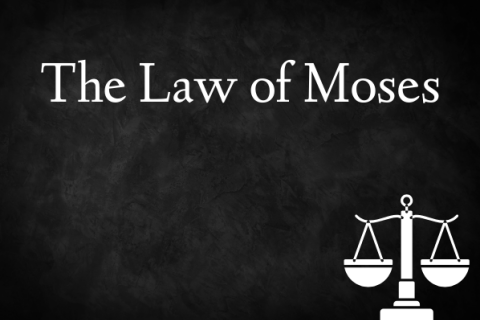
35 - From Pasture to Brickyard
The plans of wicked people cannot thwart the plan of God. While Israel suffered under Egyptian oppression, they were not forgotten by God. In Exodus 1 we see how He preserved His people both supernaturally and through those who feared Him.
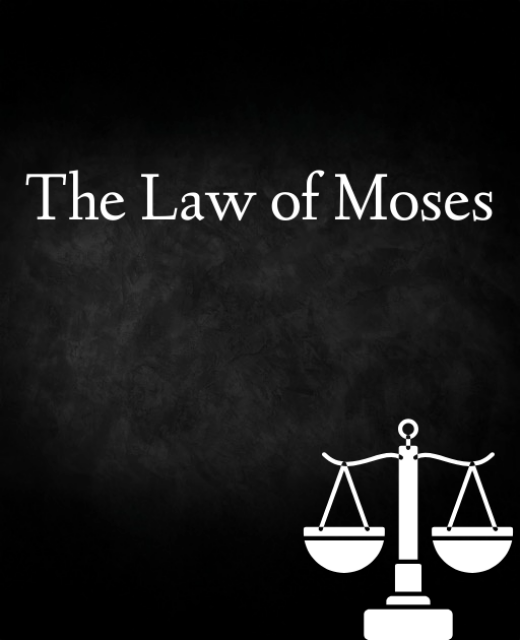

36 - Faith and a Wicker Basket
As God began working out His plan for His oppressed people, He used the faith of a humble Hebrew couple, the wise strategy of a loving mother, and His own providential work in the heart of an Egyptian princess to preserve the life of the one who would lead Israel to freedom.


37 - From Somebody to Nobody
God uniquely prepares each one of us to serve Him where He places us. Forty years in Egypt’s royal household was only part of Moses’ preparation for his greatest work. The Lord had to take him into the desert to teach him further lessons from serving as a humble shepherd.


38 - Empowered and Equipped by God
Our power and abilities will never make us adequate to serve the Lord. Rather, it is when we humbly rely upon Him and are consistently obedient to Him that we are most useful in His service. This is a truth Moses needed to learn, and so do we.

39 - Back to Egypt
God does not always lead us into easy paths. As he returned to Egypt, Moses faced opposition on various fronts. Like him, we must learn to walk by faith, trusting and obeying the Lord even when circumstances offer us little encouragement.


40 - The Battle of the Gods
The Pharaoh of Egypt was afflicted by a hardened heart and an impotent religion. Though at the height of human power and prestige, he was spiritually and morally weak and a perfect illustration of the truth that no one can defy God without suffering devastating consequences.


41 - The Battle Continues
Egypt’s pharaoh was like so many people today. When everything he believed about religion, life, and the meaning of life was shattered by reality, he chose to cling to his prideful defiance of God rather turn to God’s Word, acknowledge His work, and seek His will.


42 - Life or Death . . . At Midnight
God’s final plague on Egypt humiliated Pharaoh and the false gods of Egypt, delivered His chosen people from oppression, and vindicated Himself as the true and only God. The death of the firstborn still stands as a powerful statement of God’s power, sovereignty, and glory.


43 - On the Banks of the Deep Red Sea
Moses and the Israelites, along with millions of God’s faithful through the centuries, can testify that the Lord does not always lead us into easy paths. But there’s great peace in knowing that the one who leads us into difficult circumstances can be trusted to lead us out.


44 - Grumbling at God
Trials reveal what is in our hearts. Israel’s tests in the wilderness brought out dissatisfaction, bitterness, ingratitude, and a complaining spirit. When we learn to be thankful and trust the Lord in all things, our trials will not produce grumbling but peace and assurance.


45 - Burnout
The mark of a great leader is having the humility to listen to good advice. Indeed, that’s the mark of a wise person. Moses’ example as both a great leader and wise person reminds us to appreciate those people God brings our way with godly counsel.


46 - The Sinai Summit
God graciously chose Israel to be His special people, His treasured possession. This unique status obligated them to humbly obey and honor the Lord as His special representatives in the world. We who follow Christ today have the same responsibility.


47 - The Ten Commandments—Part 1
God’s laws for Israel were necessary to restrain sin, maintain order, and make the new nation a light to the world. The laws tell us much about God and how we today should relate to Him. This is particularly true of the first four of the Ten Commandments.


48 - The Ten Commandments—Part 2
The last six of the Ten Commandments give us vital instruction on how to get along with one another in our families and in society. They offer restraints on wickedness and reveal the heart of a gracious God.


49 - The Book of the Covenant
Israel was called into a unique relationship with God as His chosen people. As such, they were to reflect the character of God in every minute aspect of their lives. Like Israel, we who are followers of Jesus Christ also are to be living testimonies to God and His grace.


50 - In the Light of God’s Presence
The tabernacle was constructed according to a very detailed plan the Lord gave Moses. The whole system of worship that centered on the tabernacle seems very foreign to us, yet upon closer inspection it helps us grasp important truths about our own relationship to God.


51 - Teaching Tools in the Tabernacle
When we meet with fellow believers for corporate worship, our forms and practices should reflect and reinforce truths God has revealed in the Bible. This is why God was so careful to give Moses such specific instructions regarding worship in the tabernacle.


52 - Truths from Old Testament Priests
The priests were to direct Israel’s worship and teach the people about God and what He requires. Faithfully fulfilling their duties also would establish a longing for a perfect priest and a once-for-all sacrifice that would come only in the person and work of Jesus Christ.


53 - Tabernacle Furniture
Everything from the place of worship to the specifics of how to worship is spelled out in detail in the Old Testament. That worship system is not for the church, but the bedrock principles found in it provide a useful measure of our worship practices and attitudes today.


54 - Rebellion and Renewal
The people of Israel had declared their faith in the Lord, but for many their faith was more in the man Moses. With his extended absence, their professed faith in the invisible God was abandoned in favor of a man-made idol. Here is a reminder that our faith must be in God alone.


55 - Becoming the Right Kind of People
Genuine service for and fellowship with the Lord is characterized by obedience, generosity, and the pursuit of excellence and a focus on His holy character and glory. Who would think such truths could be found in a description of a building project?


56 - The Burnt and Grain Offerings
Any law or set of laws reveals something about its author—his priorities, morality, ethics, and character. God’s laws for Israel’s worship do not apply directly to believers today, but they do enlighten our understanding of our God, the one who gave these laws to Israel.


57 - A Peace Treaty from God
Peace with God has been purchased for us through the sacrifice of the sinless Son of God. The peace offering described in the book of Leviticus not only looks forward to the coming Christ but also teaches us that ingratitude for His work is inexcusable.


58 - The Truth about Sin
Sin can enter our lives so quietly we hardly notice it. In fact, it is such a part of our lives, we tend to ignore or downplay it. The offerings outlined in Leviticus 4–6 remind us of the hideous nature and pervasiveness of sin. With it, there must be no compromise.


59 - A Pattern for Worship
The forms of worship may change with time and location, but the unchanging principles that govern our worship are set forth in the Bible. This is the value of studying the worship God instituted in Leviticus and the regulations regarding those who led the nation in worship.


60 - Clean and Unclean
Fellowship with the holy God demands holy lives of His followers. At the heart of the Levitical laws relating to what is clean and unclean is this truth, as well as the assurance that God Himself has provided the way to holiness.


61 - The Day of Atonement
There is no greater joy than knowing we are forgiven and accepted by God. Israel got just a brief, yearly glimpse of that reality, which we who are in Christ enjoy today. Israel’s Day of Atonement gives us deeper understanding of and appreciation for the work of Christ.


62 - Decisions, Decisions
It is only as we seek to honor God by seeking holiness in all areas of life that we can expect to enjoy His fullest blessing and to be useful servants in His work in this world. Leviticus 17–20 sets forth God’s priorities for holy living.


63 - Suitable Leaders . . . Special Festivals
Israel’s worship was tightly regulated so that the people were led by godly leaders and constantly reminded of God’s blessings. We have greater freedom in how and when we worship today, but we too must be concerned with properly honoring God and setting an example for others.


64 - Faith 101
Following God means working alongside others in everyday tasks. God’s regulations for Israel regarding worship, punishment for various crimes, and the observance of Sabbath and Jubilee years remind us of His desire that we serve with others and encourage one another.


65 - Answering the “IF” Question of Life
Leviticus ends with a prophetic preview of Israel’s history. They would be secure in their land and enjoy God’s blessings when they obeyed Him but would suffer devastation and exile if they disobeyed. Israel serves as both a warning and an encouragement to us to follow the Lord.


66 - More than Arithmetic
In these opening chapters of Numbers, we see God preparing His people for their journey to the promised land. He not only begins preparing them for the military operation to come; He also stresses the spiritual priorities that will make them successful in their daily lives.


67 - Paving a Path to Purity
Neither a church nor an individual can hope to follow and honor the Lord without a commitment to pursuing holiness. As these chapters in Numbers remind us, a holy life is not sin-free, but it is marked by a desire to be free of sin in every relationship and activity of life.


68 - The Preparation Is Complete
We prepare for many things—career, family, retirement, even death. But chapters 7–9 of the book of Numbers reminds us that we are never really prepared for the future at all unless we are committed to praising, thanking, and worshiping the Lord.


69 - Fresh Food and a Power Play
The people Moses led are a warning to us that complaining about difficult circumstances is not just counterproductive; it’s also an affront to God. Rather than complain about what He allows in our lives, we should be grateful He is always present to help and encourage us.


70 - When Obstacles Grow Bigger than God
God calls us to trust His promises and consistently live in accordance with them. He doesn’t ask us to examine His promises in light of the current situation and determine whether we should believe them and act on them. This was Israel’s fatal mistake.


71 - Promises, Leaders, and Priests
Israel’s sad example reminds us that God’s love and compassion are steadfast. He does not withdraw His promises or change His plans when we rebel against Him but patiently urges and waits for our repentance and gives us all we need to follow and serve Him.


72 - Organized Worship
God’s instructions to Israel in Numbers 18–19 emphasize two important principles relevant to His people in every age. We must follow God’s revealed order and fill the roles He has for us in His body; and we must always seek purity and holiness in our relationship with Him.


73 - Serpent on a Pole
Every generation must answer for their own response to the Lord. As the new generation in Israel neared the promised land, they were given living lessons on the importance of obedience, faith, and righteous living. These principles equally apply to us today.


74 - Balaam and a Talking Donkey
The opposition to God’s chosen people Israel came in many forms. The same is true for us. Our enemy continually seeks opportunities to discredit, distract, and destroy us. We can never rest in our successes and let our guards down.


75 - Reminders of God’s Attributes
To consistently follow what God says, we must have an accurate understanding of who God is. God is revealed to us in the Bible and quite often through His acts recorded there. God’s acts in Numbers 26–31 reveal a number of important and impressive attributes of God.


76 - Learning from the Leadership of Moses
Too many people fail to heed the lessons of the past, are consumed with the concerns of the moment, and give little thought to the future. Moses is a commendable model of one who wisely learns from the past but is engaged in the present and focused on preparing for the future.


77 - Lessons from History
History is a wonderful teacher but one that is often ignored. The book of Deuteronomy begins with a brief and selective review of Israel’s history. Israel’s history—and our own—should remind us of God’s amazing mercy and grace and spur us on to more faithful obedience to Him.


78 - Testifying to the Next Generation
Neither God nor His Word change over time. But memories fade. New generations arise, and people forget the lessons of history. God’s revelation of Himself and His standards must be repeated, remembered, and taken to heart. This is what Israel needed, and we are no different.


79 - A Reminder of Grace
Israel could not take credit for God’s gracious works on their behalf. He freely chose to love them and care for them. Their obligation was to love Him in return, and that meant obeying Him. For Israel—and for us—expressions of love for God are empty apart from obedience to Him.


80 - Five Qualities of True Worship
Worship today in our churches differs in many ways from worship in Old Testament Israel, but the guiding principles of Israel’s worship are a helpful guide for the modern-day church. Some essential qualities of true worship are outlined for us in Deuteronomy 12–16.


81 - Righteousness on Review
God’s commands are not simply legal requirements; they reveal God’s righteous character. So, even laws specifically for Old Testament Israel are of great value to us today. As we study His law, we grow in knowledge and appreciation of God, and our worship of Him is enhanced.


82 - Blessings and Consequences
The highest motivation for obeying God is love for Him. But we also need rewards for obedience and consequences for disobedience to move us to faithfully follow Him. This is what stands behind the instructions for Israel’s covenant renewal in Deuteronomy 27–28.


83 - Choosing Life Today
The choices before us, like those before Israel in Deuteronomy 29–30, are pretty simple. Obey the Lord, and enjoy His blessing; or disobey Him, and experience His discipline. Thankfully, God is always faithful, accessible, and ready to forgive and restore us when we seek Him.


84 - The Song of Moses
God designed music to speak to both our minds and our emotions. The song of Moses demonstrates that truly God-honoring music will communicate the truths of God and call us to act upon them.


85 - A Final Blessing
The death of Moses, the author of the first five books of the Bible, marks the end of an era for Israel. Israel’s disobedience and rebellion against God stand in stark contrast to their faithful leader, who leaves them with his example and his gracious blessing for the future.

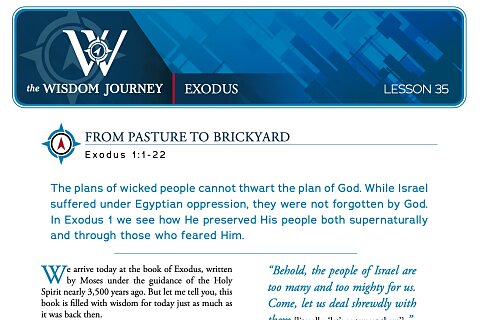
Exodus Study Guides
The Wisdom Journey study guides for the book of Exodus.
NOTE: This is a digital resource. After you checkout, it will be available in the "My Media" section of your account.
These study guides are for the use of the purchaser and his/her immediate family. Please do not distribute or share this material.
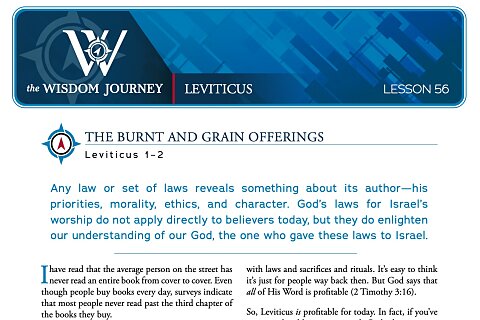
Leviticus Study Guides
The Wisdom Journey study guides for the book of Leviticus.
NOTE: This is a digital resource. After you checkout, it will be available in the "My Media" section of your account.
These study guides are for the use of the purchaser and his/her immediate family. Please do not distribute or share this material.
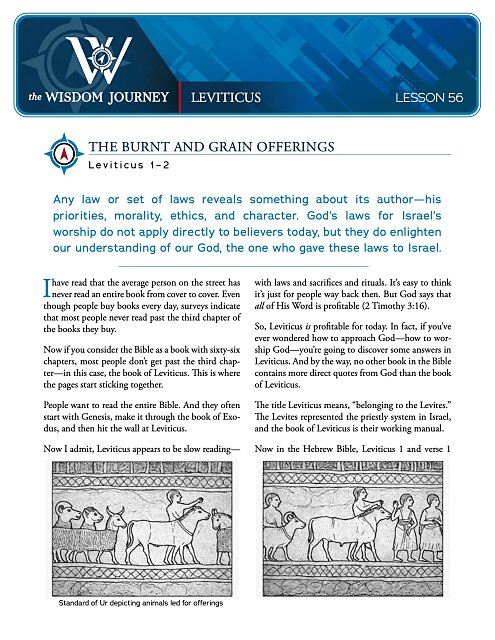
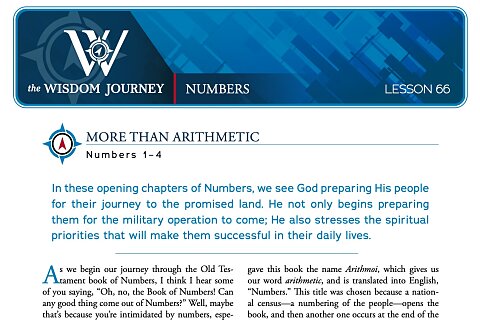
Numbers Study Guides
The Wisdom Journey study guides for the book of Numbers.
These manuscripts offer a detailed exploration of the Old Testament book of Numbers, suitable for a digital download. The book of Numbers, also called "Bemidbar" in Hebrew which means "in the wilderness," chronicles the journey of the Israelites through the Sinai wilderness. The digital download would allow a reader to delve into the key themes, stories, and teachings within this book of the Bible.
Here’s a breakdown of what the digital download encompasses:
- Census and Preparation: The book begins with a census of the people of Israel, which serves as a military preparation for their journey to the promised land. This includes the organization of the tribes, their military readiness, and the roles of the Levites, who are exempt from military service to care for the tabernacle. The tabernacle is central, with each tribe positioned so that their tents face the visible presence of God, highlighting God's role as their leader. The tabernacle also represents the church in the New Testament, where every believer has a part to play.
- Purity and Holiness: The manuscripts emphasize God’s call to purity, both personal and national, including the removal of those with disease and the addressing of personal sins. It includes a trial procedure for cases of suspected adultery that depended on God's intervention, and highlights the importance of marital faithfulness. The concept of the Nazirite vow is discussed as a means of setting oneself apart for God. The New Testament also emphasizes the same passion for purity.
- Preparation and Worship: The materials emphasize that preparation is essential for victory. The people of Israel prepare by bringing offerings and dedicating the tabernacle. The Levites are ordained and commissioned for service, and the Passover is celebrated to remember God’s deliverance. The presence of God is made visible by the glory cloud, which guides them through the wilderness.
- Challenges and Complaining: The journey is not without its challenges, and the Israelites are prone to complaining, which is an affront to God. They complain about their hardships and crave things they left behind in Egypt. Moses also complains to God about the burden of leading the people, and God responds by providing him with helpers. God also provides meat to the people, but they are disciplined for their rebellion. The manuscripts also show that leadership can be undermined by jealousy.
- Faith and Obedience: Despite obstacles, the manuscripts highlight the importance of trusting in God’s promises. The people's refusal to enter the promised land because of fear is a fatal mistake. The spies who brought back a bad report caused the people to rebel, ignoring Caleb and Joshua who urged them to trust God. God’s promise to give them the land is reaffirmed, despite their rebellion, and forgiveness is offered through sacrifice.
- Leadership and Authority: The Lord reaffirms His chosen leaders and high priest through various events and miracles. The authority of Moses and Aaron is challenged, but God intervenes to confirm their leadership. The structure of worship and the roles of the priests and Levites are clarified. These events serve to emphasize that God's leadership is divinely chosen and not subject to a power grab.
- Principles for Living: The text emphasizes following God's order and seeking purity. The importance of the interdependence of the people, the priests, and the Levites is emphasized. Cleansing laws were provided to remove uncleanness and remind them to approach God with holiness. The anticipation for a permanent cleansing through Jesus Christ is mentioned.
- Pride, Timing, and Faith: The manuscripts illustrate the consequences of pride, as seen when Moses disobeys God and strikes the rock instead of speaking to it. The people are encouraged to trust God’s timing, as demonstrated by their detour around Edom. The necessity of depending on God daily and the importance of faith are shown through both their victories and their mistakes. The image of the bronze serpent is used to illustrate the need to look to Jesus for salvation.
- Victories and Warnings: The people of Israel experience military victories against the Amorites and Moabites but are warned against complacency. The story of Balaam is told, where God uses a donkey and a false prophet to speak his message and bless Israel. However, Balaam's advice to lure Israel into immorality and idolatry, caused a great downfall for the nation. The manuscripts show that despite victories, believers are never to rest and must always be on guard against temptation.
- God's Attributes: The materials highlight God’s attributes including faithfulness, fairness, wisdom, and relational nature, justice, and holiness. God is faithful in keeping His promises, fair in His dealings with all people, and wise in choosing leaders. He desires a close relationship with His people, is just in His judgments, and holy, requiring His people to be holy as well.
- Moses' Leadership: The end of the book of Numbers focuses on the leadership of Moses. He addresses immediate concerns, reviews the past, and prepares for the future of Israel. The division of the promised land, the establishment of Levitical cities, and the provision of cities of refuge are all discussed. The importance of justice and the need for multiple witnesses are also emphasized.
This digital download offers a comprehensive look at the book of Numbers, providing not just a historical account but also vital spiritual lessons for contemporary life.
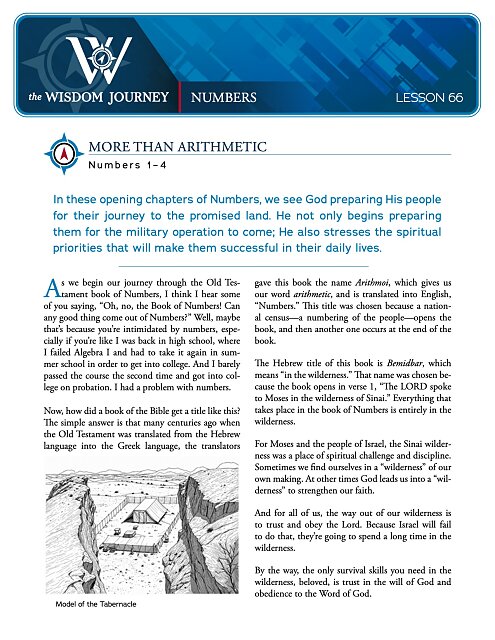
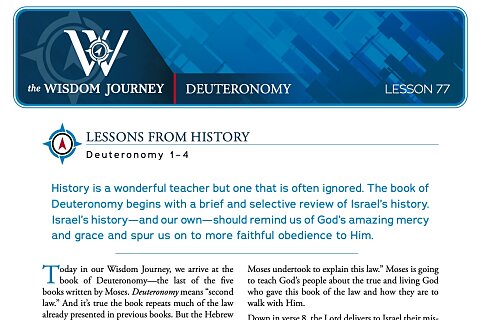
Deuteronomy Study Guides
The Wisdom Journey study guides for the book of Deuteronomy.
NOTE: This is a digital resource. After you checkout, it will be available in the "My Media" section of your account.
These study guides are for the use of the purchaser and his/her immediate family. Please do not distribute or share this material.
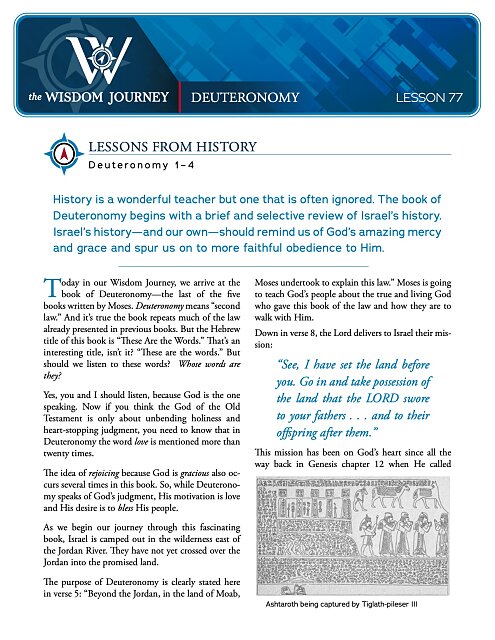
Product Details
| Format | Digital |
|---|---|
| Product Number / SKU | The Law Of Moses Bundle |
